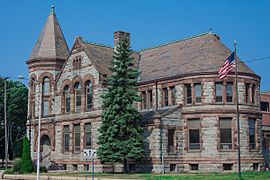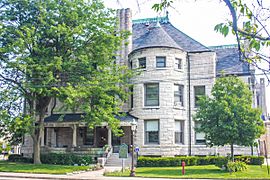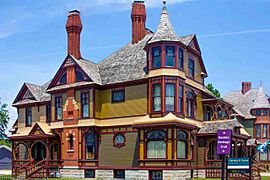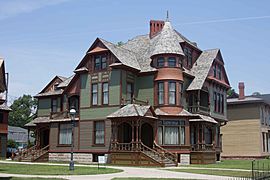Muskegon Historic District facts for kids
Quick facts for kids |
|
|
Muskegon Historic District
|
|
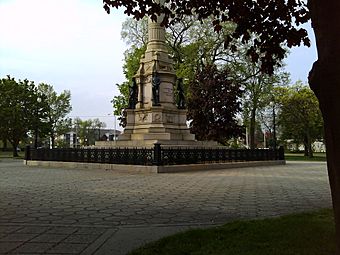
Soldiers and Sailors Monument, Hackley Park
|
|
| Location | Bounded roughly by Clay, Muskegon, 2nd, and 6th Sts., Muskegon, Michigan |
|---|---|
| Area | 20 acres (8.1 ha) |
| Architectural style | Italianate |
| NRHP reference No. | 72000647 |
| Added to NRHP | September 27, 1972 |
The Muskegon Historic District is a special area in Muskegon, Michigan, filled with old and important buildings. It includes both public places and homes. This historic district covers several city blocks, roughly from Clay Avenue to Muskegon Avenue, and from Second Street to Sixth Street. It was officially added to the National Register of Historic Places in 1972, which means it's recognized as a significant historical site.
Contents
What Makes the District Special?
The Muskegon Historic District has about twenty main buildings. It also has smaller buildings like carriage houses, which were used to keep horses and carriages long ago. This area includes public buildings, private homes, and a beautiful green space called Hackley Park.
Some of the important public buildings you can find here are:
- the Hackley Public Library
- the Muskegon Museum of Art
- the Hackley School Administration Building
Famous homes in the district include:
- the Charles H. Hackley House
- the Hume House
- the John Torrent House
Many other houses are also part of the district. Most of these homes were built in the 1880s. They are mostly in the Italianate style, which means they have features like low-pitched roofs and tall, narrow windows. These houses are still in great shape and people live in them today.
Important Buildings and Places
Here are some of the key spots in the Muskegon Historic District:
- Hackley Public Library (Third and Webster)
- This library was built thanks to a gift from Charles Hackley in 1888.
- It was designed by Patton and Fisher, an architecture firm from Chicago.
- The building is made of pink granite with brownstone details. It's built in the Romanesque Revival style, which looks a bit like old Roman buildings with round arches.
- The library first opened its doors in 1890.
- St Paul's Episcopal Church (Third and Clay)
- This church is made of grayish greenstone.
- It was built in 1892, with a lot of funding from Thomas Hume.
- Muskegon Museum of Art (296 Webster)
- The Muskegon Museum of Art is built in the Classical Revival style. This style often uses elements from ancient Greek and Roman buildings, like columns.
- S. S. Berman of Chicago designed the building.
- Charles Hackley also helped fund this museum. He left money for it after he passed away in 1905.
- The museum opened in 1912.
- John Torrent House (Third and Webster)
- The John Torrent House is a large home with 30 rooms.
- It's made of granite and was built in 1892.
- Hackley Park (between Clay & Webster, Third & Fourth)
- Charles Hackley gave both the land for Hackley Park and the statues in it to the city.
- The statues honor Union soldiers, sailors, and leaders from the American Civil War.
- The Soldiers and Sailors Monument stands in the middle of the park.
- Statues of important figures like Abraham Lincoln, David Farragut, Ulysses S. Grant, and William T. Sherman are at the corners of the park.
- Hackley and Hume Houses (Webster and Sixth)
- These two homes were built in 1887.
- They are in the Victorian style, which means they often have lots of decorative details.
- They were built for Charles Hackley and his business partner, Thomas Hume.
- There's also a shared carriage house between their homes.
A Glimpse into the Past
In the late 1800s, Muskegon was a very important center for the lumber business in Michigan. People like Charles H. Hackley became very rich from cutting down trees and selling timber.
Charles Hackley used a lot of his money to help his hometown. He built a public library in 1890, a school in 1893, and an art gallery in 1912. He also built his own house in 1887, around the same time his business partner, Thomas Hume, built his home nearby. Hackley Park, which is in the middle of this historic district, is a memorial to Charles Hackley. John Torrent, another person who made money in the lumber business, built his house in the area in 1892.
Today, the Hackley and Hume houses have been carefully restored. You can visit them as the "Hackley & Hume Historic Sites." The John Torrent House is currently owned by the Red Cross.
Gallery
 | Jewel Prestage |
 | Ella Baker |
 | Fannie Lou Hamer |




